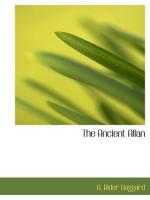Then heralds announced the coming of Pharaoh and all grew silent. He and his company entered with pomp and we, his subjects, prostrated ourselves in the ancient fashion.
“Rise, my guests,” he cried. “Rise, my people. Above all do you rise, Shabaka, my beloved cousin, to whom Egypt and I owe so much.”
So we rose and I took my seat in a place of honour having my mother at my side, and looked about me for Amada, but in vain. There was the carven chair upon which she should have been among those of the princesses, but it was empty. At first I thought that she was late, but when time went by and she did not appear, I asked if she were ill, a question that none seemed able to answer.
The feast went on with all the ancient ceremonies that attended the crowning of a Pharaoh of Egypt, since there were old men who remembered these, also the scribes and priests had them written in their books.
I took no heed of them and will not set them down. At length Pharaoh pledged his subjects, and his subjects pledged Pharaoh. Then the doors were opened and through them came a company of white-robed, shaven priests bearing on a bier the body of a dead man wrapped in his mummy-cloths. At first some laughed for this rite had not been performed in Egypt since she passed into the hands of the Great Kings of the East and therefore was strange to them. Then they grew silent since after all it was solemn to see those death-bearing priests flitting in and out between the great columns, now seen and now lost in the shadows, and to listen to their funeral chants.
In the hush my mother whispered to me that this body was that of the last Pharaoh of Egypt brought from his tomb, but whether this were so I cannot say for certain. At length they brought the mummy which was crowned with a snake-headed circlet of the royal uraeus and still draped with withered funeral wreaths, and stood it on its feet opposite to Peroa just behind and between my mother and me in such a fashion that it cut off the light from us.
The faint and heavy smell of the embalmer’s spices struck upon my nostrils, a dead flower from the chaplets fell upon my head and, glancing over my shoulder, I saw the painted or enamelled eyes in the gilded mask staring at me. The thing filled me with fear, I knew not of what. Not of death, surely, for that I had faced a score of times of late and thought nothing of it. Indeed I am not sure that it was fear I felt, but rather a deep sense of the vanity of all things. It seemed to come home to me—Shabaka or Allan Quatermain, for in my dream the inspiration or whatever it might be, struck through the spirit that animated both of us—as it had never done before, that everything is nothing, that victory and love and even life itself have no meaning; that naught really exists save the soul of man and God, of whom perchance that soul is a part sent forth for a while to do His work through good and ill. The thought lifted me up and yet crushed me, since for a moment all that makes a man passed away, and I felt myself standing in utter loneliness, naked before the glory of God, watched only by the flaming stars that light his throne. Yes, and at that moment suddenly I learned that all the gods are but one God, having many shapes and called by many names.




